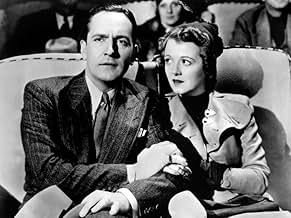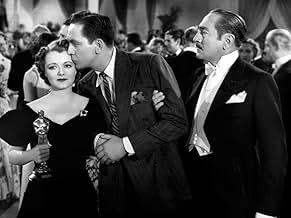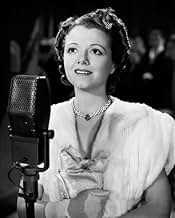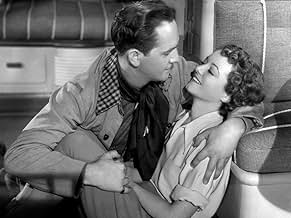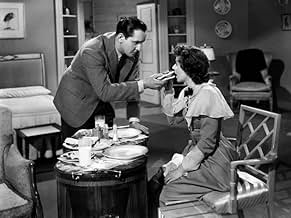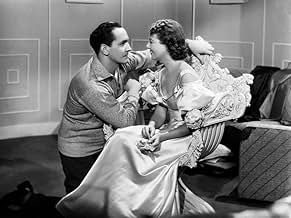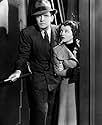VALUTAZIONE IMDb
7,3/10
11.572
LA TUA VALUTAZIONE
Una giovane donna arriva a Hollywood con sogni di celebrità, ma li raggiunge solo con l'aiuto di un noto attore, ora alcolizzato, il cui periodo di maggior fama è ormai alle sue spalle.Una giovane donna arriva a Hollywood con sogni di celebrità, ma li raggiunge solo con l'aiuto di un noto attore, ora alcolizzato, il cui periodo di maggior fama è ormai alle sue spalle.Una giovane donna arriva a Hollywood con sogni di celebrità, ma li raggiunge solo con l'aiuto di un noto attore, ora alcolizzato, il cui periodo di maggior fama è ormai alle sue spalle.
- Regia
- Sceneggiatura
- Star
- Vincitore di 1 Oscar
- 7 vittorie e 7 candidature totali
Guinn 'Big Boy' Williams
- Posture Coach
- (as Guinn Williams)
Jean Acker
- Woman at Preview
- (non citato nei titoli originali)
Eric Alden
- Niles' Assistant
- (non citato nei titoli originali)
Irving Bacon
- Station Agent
- (non citato nei titoli originali)
Jane Barnes
- Waitress #1
- (non citato nei titoli originali)
Vince Barnett
- Otto
- (non citato nei titoli originali)
Clara Blandick
- Aunt Mattie
- (non citato nei titoli originali)
Recensioni in evidenza
I believe this as one of the most beautiful pictures I have ever seen. I enjoyed the story, the dialog and above all I enjoyed the atmosphere and the actors. All of them are great but to me Fredric March is outstanding.
Norman/Alfred is a wonderful character: frail, undignified, touchy, weak and able to love Vicki/Esther so much, with all his heart.
Fredric March brings all of it on the screen, providing one of his best performances here.
If you would like to become an actor, I believe you should watch this movie and Mr. March's way of acting. Pay attention to his eyes, his hands, his face and his moves, especially when he interrupts his wife thanking everybody for the Oscar she got and claims he deserves three statues for the worse performances.
He is overcome by himself and starts dying. I just shivered.
To me, this version can't be compared to its remakes. The allure and the fascination of Hollywood have been perfectly represented here, together with an unpleasant and creepy feeling of emptiness.
Norman/Alfred is a wonderful character: frail, undignified, touchy, weak and able to love Vicki/Esther so much, with all his heart.
Fredric March brings all of it on the screen, providing one of his best performances here.
If you would like to become an actor, I believe you should watch this movie and Mr. March's way of acting. Pay attention to his eyes, his hands, his face and his moves, especially when he interrupts his wife thanking everybody for the Oscar she got and claims he deserves three statues for the worse performances.
He is overcome by himself and starts dying. I just shivered.
To me, this version can't be compared to its remakes. The allure and the fascination of Hollywood have been perfectly represented here, together with an unpleasant and creepy feeling of emptiness.
This movie has been done three times: this one in 1937, then in 1954 and finally 1976. I've now seen only this original, and only because I wanted to see a young Janet Gaynor for the first time. Beware, however: a 2012 version is now in pre-production; although, as we all know, it may never be completed – Hollywood being what it is.
Of course, this story – rags to riches in the acting business - was done first by others – principally Katherine Hepburn in Morning Glory (1933) and, oddly enough, again in Stage Door (1937), and again with Katherine Hepburn ably assisted by a host of well-known Hollywood actors, including the tireless Adolphe Menjou who never seemed to mind playing a Hollywood boss, in this and many other similar movies. The difference with Star, of course, is it's maybe the first movie to dig into Hollywood screen acting and make an attempt to lay it bare.
So the story is banal, as most rags to riches fantasies are. Equally, however, it's an exceptionally well-done narrative that strips the gloss off Hollywood – in a genteelly, low-key manner – to show 1937 viewers just what it took to claw your way to the top. And, let's face it: being released in the dog days of the Great Depression and as America geared up for war, audiences of the day lapped it up. Hard times and war drums were on the way again: the people needed to see rags to riches in action, needed to know that hardship and sacrifice were just around the corner. And, failure was not an option.
Today's mainstream audience, on the other hand, would probably laugh at the perceived and implied naivety of the 1930s crowd.
The acting – from Frederic March as Norman Maine (the main actor in the story – such an appropriate name!) who is already on the slippery slopes to alcoholic and acting oblivion just as he meets and falls in love with Janet Gaynor as Esther Blodgett as the aspiring Hollywood wannabee; and both ably assisted by Adolphe Menjou as Hollywood producer, Oliver Niles – raises it to the level of simplistic melodrama and without descending into bathos, fortunately. And that's largely due to March, who is outstanding – literally and figuratively – as the actor with everything to lose. Menjou does his usual, highly professional turn – and never misses a turn or beat. And Gaynor? Well, I'd say she was perfectly cast as the newcomer who makes good, to a point: her down-to-earth, home-spun, wide-eyed trusting nature is personified with her looks, tone and carriage – almost to the point of outdoing Shirley Temple.
Oddly enough, though, Gaynor made her last movie in 1938 and did not reappear until 1957, with a guest appearance in Bernadine with Pat Boone, whom some would remember.
This production of Star, in color, certainly appeals to the visual senses, displaying the lavishness that beckoned neophytes and to which stars become accustomed, all too easily. In contrast, it also shows – with comedy or gentle satire – the daily grind of making movies and is, perhaps, the genesis of the much over-use of out-takes, bloopers and so on in some of today's productions. Photography, editing and script – particularly the last – are all up to scratch, as you would expect from a Selznick/Wellman venture. Dorothy Parker – who wrote the screenplay and who was one of literature's bete noire of the 1930s set – constructed some of the most memorable lines in Hollywood history, especially those from Menjou. Worth seeing just for that alone, in my opinion.
Interestingly and coincidentally, Nathanael West – one-time Hollywood screen writer – published The Day of The Locust in 1939, a novel that takes the Star story and twists it into a horrific nightmare. Not until 1973, however, did John Schlesinger direct a screen version of the same name that has not been repeated; see that one and find out why. Not to be outdone, David Lynch, film noire auteur extraordinaire, has gone one further with Muholland Drive (2001), arguably the ultimate screen statement to date about the prostitution of screen art in the pursuit of fame and fortune, and one of the grittiest horror stories ever put to film. Considering some of the scenes of both, I wouldn't at all be surprised if Lynch has seen this version of Star.
As a significant piece of Hollywood history, this 1937 version should be seen by all film lovers and the starry-eyed. Highly recommended.
Then, come down to earth with The Day of The Locust and deliver a coup de grace with Mulholland Drive, both of which I've reviewed for this site. Enjoy.
Of course, this story – rags to riches in the acting business - was done first by others – principally Katherine Hepburn in Morning Glory (1933) and, oddly enough, again in Stage Door (1937), and again with Katherine Hepburn ably assisted by a host of well-known Hollywood actors, including the tireless Adolphe Menjou who never seemed to mind playing a Hollywood boss, in this and many other similar movies. The difference with Star, of course, is it's maybe the first movie to dig into Hollywood screen acting and make an attempt to lay it bare.
So the story is banal, as most rags to riches fantasies are. Equally, however, it's an exceptionally well-done narrative that strips the gloss off Hollywood – in a genteelly, low-key manner – to show 1937 viewers just what it took to claw your way to the top. And, let's face it: being released in the dog days of the Great Depression and as America geared up for war, audiences of the day lapped it up. Hard times and war drums were on the way again: the people needed to see rags to riches in action, needed to know that hardship and sacrifice were just around the corner. And, failure was not an option.
Today's mainstream audience, on the other hand, would probably laugh at the perceived and implied naivety of the 1930s crowd.
The acting – from Frederic March as Norman Maine (the main actor in the story – such an appropriate name!) who is already on the slippery slopes to alcoholic and acting oblivion just as he meets and falls in love with Janet Gaynor as Esther Blodgett as the aspiring Hollywood wannabee; and both ably assisted by Adolphe Menjou as Hollywood producer, Oliver Niles – raises it to the level of simplistic melodrama and without descending into bathos, fortunately. And that's largely due to March, who is outstanding – literally and figuratively – as the actor with everything to lose. Menjou does his usual, highly professional turn – and never misses a turn or beat. And Gaynor? Well, I'd say she was perfectly cast as the newcomer who makes good, to a point: her down-to-earth, home-spun, wide-eyed trusting nature is personified with her looks, tone and carriage – almost to the point of outdoing Shirley Temple.
Oddly enough, though, Gaynor made her last movie in 1938 and did not reappear until 1957, with a guest appearance in Bernadine with Pat Boone, whom some would remember.
This production of Star, in color, certainly appeals to the visual senses, displaying the lavishness that beckoned neophytes and to which stars become accustomed, all too easily. In contrast, it also shows – with comedy or gentle satire – the daily grind of making movies and is, perhaps, the genesis of the much over-use of out-takes, bloopers and so on in some of today's productions. Photography, editing and script – particularly the last – are all up to scratch, as you would expect from a Selznick/Wellman venture. Dorothy Parker – who wrote the screenplay and who was one of literature's bete noire of the 1930s set – constructed some of the most memorable lines in Hollywood history, especially those from Menjou. Worth seeing just for that alone, in my opinion.
Interestingly and coincidentally, Nathanael West – one-time Hollywood screen writer – published The Day of The Locust in 1939, a novel that takes the Star story and twists it into a horrific nightmare. Not until 1973, however, did John Schlesinger direct a screen version of the same name that has not been repeated; see that one and find out why. Not to be outdone, David Lynch, film noire auteur extraordinaire, has gone one further with Muholland Drive (2001), arguably the ultimate screen statement to date about the prostitution of screen art in the pursuit of fame and fortune, and one of the grittiest horror stories ever put to film. Considering some of the scenes of both, I wouldn't at all be surprised if Lynch has seen this version of Star.
As a significant piece of Hollywood history, this 1937 version should be seen by all film lovers and the starry-eyed. Highly recommended.
Then, come down to earth with The Day of The Locust and deliver a coup de grace with Mulholland Drive, both of which I've reviewed for this site. Enjoy.
this is the first version of this movie made,and the only version i have seen so far.i liked it.i thought it was touching and ironic,and also tragic.it basically tells what the movie business can do to you,and the sacrifices that are made.it also shows how disposable the industry and the people in it are.as long as you are the flavour of the week,everything seems fine.but when you're no longer useful,reality hits and things can come crashing down.that's what basically happens in this story.it's an indictment(ironically)of the movie industry,however subtle.regardless,i thought it was well done.the acting by the tow leads,Janet Gaynor,and Frederic March,as well as the supporting performances,are terrific.i also thought the writing was very good,and the movie flows very well.for me,A Star is Born gets an 8/10
Janet Gaynor plays Esther Blodgett beautifully, a girl who leaves for Hollywood with dreams of film magazines and the blessing of her granny. Once there she finds it tough-going until meeting Norman Maine (Fredric March) at a party. We've already seen Norman drunk at a theatre but here he charms Esther and actually gets her into the movies before marrying her and watching his own career crumble. March is excellent in this, and the look of the film is surprisingly modern with its lovely technicolor and gadgets (I particularly like the shower in the motor home Esther and Norman take on honeymoon). Esther's move to become star Vicki Lester, Oscar-winning actress, is unbelievable but as her real-life tragedy unfolds, compelling. And who can stay dry-eyed at the end? Remade with music and Judy Garland in 1954 (very well) but this first version is a jewel amongst other 30s classics.
When you see this masterpiece, remember that more than 65 years have passed since it debuted on the big screen. How many contemporary films will dazzle and delight in 2065?
Sure, we have seen this story before, but this was the first incarnation. Sure all films are in color today, but notice the rich, full-rigged use of color here, only a decade after talkies began. Dialogue sound familiar, well many of the lines originated here (thanks Dorothy Parker).
First caught this in the movie theatre around 1975 as this David O. Selznick production had been out of circulation. Judy Garland's troubled but ultimately engrossing and hugely entertaining remake was already familiar to me. So how does a classic compare to its first version. To me, it is one of the 1930's masterworks.
How perfect to cast Janet Gaynor in the role, an Oscar winner herself at 20 --- that child-like voice unforgettable. Fredric March, like Gaynor already a star and early Oscar recipient, world weary and helpless. The art deco, lavish production, haunting music, and scene after scene of "behind the scenes Hollywood", well they sure worked for me. "Kitsch" an old friend labeled it, but to me, memorable.
I love watching this movie --- hope you enjoy it as well.
Sure, we have seen this story before, but this was the first incarnation. Sure all films are in color today, but notice the rich, full-rigged use of color here, only a decade after talkies began. Dialogue sound familiar, well many of the lines originated here (thanks Dorothy Parker).
First caught this in the movie theatre around 1975 as this David O. Selznick production had been out of circulation. Judy Garland's troubled but ultimately engrossing and hugely entertaining remake was already familiar to me. So how does a classic compare to its first version. To me, it is one of the 1930's masterworks.
How perfect to cast Janet Gaynor in the role, an Oscar winner herself at 20 --- that child-like voice unforgettable. Fredric March, like Gaynor already a star and early Oscar recipient, world weary and helpless. The art deco, lavish production, haunting music, and scene after scene of "behind the scenes Hollywood", well they sure worked for me. "Kitsch" an old friend labeled it, but to me, memorable.
I love watching this movie --- hope you enjoy it as well.
Lo sapevi?
- QuizThe first all-color film nominated for an Academy Award for Best Picture.
- BlooperThe Night Court Judge refers to the "commonwealth" of California, but California isn't one of the states with commonwealth status. The judge should have referred to the "state" instead.
- Citazioni
Grandmother Lettie: If you've got one drop of my blood in your veins, you won't let Mattie or any of her kind break your heart, you'll go right out there and break it yourself.
- Versioni alternativeAlso available in black and white
- ConnessioniEdited into What's Cookin' Doc? (1944)
- Colonne sonoreCalifornia, Here I Come
(1924) (uncredited)
Music by Joseph Meyer
(variations in the score as Esther arrives in Hollywood)
I più visti
Accedi per valutare e creare un elenco di titoli salvati per ottenere consigli personalizzati
Dettagli
- Data di uscita
- Paese di origine
- Lingua
- Celebre anche come
- Nace una estrella
- Luoghi delle riprese
- Aziende produttrici
- Vedi altri crediti dell’azienda su IMDbPro
Botteghino
- Budget
- 1.173.639 USD (previsto)
- Tempo di esecuzione
- 1h 51min(111 min)
- Proporzioni
- 1.37 : 1
Contribuisci a questa pagina
Suggerisci una modifica o aggiungi i contenuti mancanti


